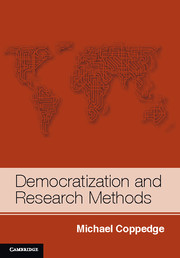Book contents
- Frontmatter
- Contents
- List of tables
- List of figures
- Acknowledgments
- 1 Research methods and democratization
- 2 Defining and measuring democracy
- 3 Criteria for evaluating causal theories
- 4 Checklists, frameworks, and Boolean analysis
- 5 Case studies and comparative history
- 6 Formal models and theories
- 7 Rigor in extensive and intensive testing
- 8 Political culture and survey research
- 9 Quantitative testing
- 10 An agenda for future research
- References
- Index
1 - Research methods and democratization
Published online by Cambridge University Press: 05 July 2012
- Frontmatter
- Contents
- List of tables
- List of figures
- Acknowledgments
- 1 Research methods and democratization
- 2 Defining and measuring democracy
- 3 Criteria for evaluating causal theories
- 4 Checklists, frameworks, and Boolean analysis
- 5 Case studies and comparative history
- 6 Formal models and theories
- 7 Rigor in extensive and intensive testing
- 8 Political culture and survey research
- 9 Quantitative testing
- 10 An agenda for future research
- References
- Index
Summary
Why are some countries democracies while others are not? Why do some democracies survive while others fail? These are core questions in political science, sociology, history, and economics. Scholars have been trying to answer them ever since Aristotle. After 2,500 years of research, what do we know? How do we know it? This book answers the latter two questions.
Rationale
After so much has been written on these matters, I am obliged to explain why we need this particular book on democracy. The answer is simple: to distill this vast literature down to a comprehensible critical survey! Democratization has been studied for so long and in so many different ways that the literature is overwhelming and bewildering. It encompasses ideas borrowed from the study of early modern Europe, strategic bargaining games, Asian cultures, measurement theory, public opinion about economic trends, legacies of colonialism, geographic networks, theories of class struggle, demographic trends, war and peace, and many other phenomena. There are dozens of hypotheses about the causes of democracy (Chapter 4 summarizes fifty-five of them). The first step toward digesting this mountain of scholarship is taking a comprehensive inventory of all the possible explanations.
- Type
- Chapter
- Information
- Democratization and Research Methods , pp. 1 - 10Publisher: Cambridge University PressPrint publication year: 2012

